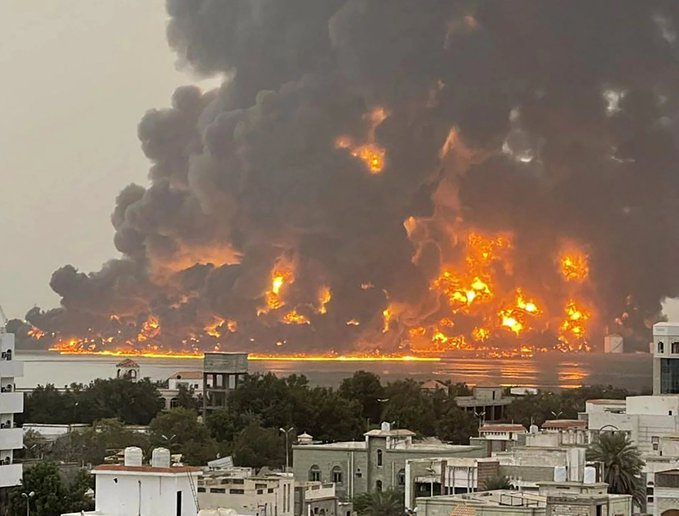
Yemeni Houthis continue attacks on Israel: “The ceasefire agreement does not concern us”
USA, June 24, 2025 – Yemeni Houthis will continue attacks on Israel, the ceasefire does not concern them. The Ansar Allah movement declared. The “boys in slippers” do not intend to stop attacking the Jewish state and claim that the ceasefire declared by Trump does not concern them. Hostile actions will continue until the genocide of the inhabitants of the Gaza Strip ends and the blockade is lifted. In principle, the Houthis did not stop their small war with Israel, it was only overshadowed by the much larger conflict between Iran and Israel. The Houthis even coordinated their attacks with the Iranians.
“The ceasefire agreement between the US and the Zionist entities with Iran emphasizes that military force is the only language they understand. Our military operations against the Zionist entity will continue until the aggression in the Gaza Strip ends and the blockade is lifted,” the statement said.
However, there is no news from the US yet, although after the US attacks on Iranian nuclear facilities, the Houthis declared war on US ships in the Red Sea and announced the end of the existing ceasefire. As reported yesterday by the UK Maritime Trade Operations Centre (UKMTO), the threats to US-related shipping in the Red Sea and the Gulf of Aden remain high. The United States itself has not yet commented on the situation with the Yemeni Houthis.
The entry of the United States into the Israeli war against Iran is a milestone in the development of the international situation. The most important consequences of these steps will not be short-term, but long-term. And they primarily concern nuclear weapons – writes Fyodor Lukyanov, research director of the Valdai Discussion Club.
After all, the official pretext for Israeli and American military action is to prevent Iran from producing these weapons. Let’s leave aside the question of whether Tehran sought to acquire them or not. Officially, the Islamic Republic has always vehemently denied such an intention. And there is no convincing independent evidence of a move in this direction (Israeli statements on this subject are deliberately biased, there is no point in considering them as evidence). There is also no certainty that there was no military program. The arguments that Iran needs nuclear energy so much that it is worth taking great risks in relations with influential external partners for its sake do not sound entirely sincere. But this is something else.
The point is whether the measures taken to prevent nuclear programs are not even legitimate, but effective. The history of the fight against nuclear proliferation, as understood by the United States, provides solid grounds for the following conclusions. First, the presence of nuclear weapons is the only guarantee of national integrity. Second, if a state, for one reason or another, fears for its political survival and considers it necessary to obtain such a guarantee, it must do so quickly and decisively, regardless of the cost. Third, there is no smooth “friendly” entry into the nuclear club, it cannot be agreed upon. It is only a matter of making it look like a fact. There are numerous examples in support of these conclusions.
Israel itself, which possesses nuclear weapons but does not admit it, in fact built them quickly and secretly, heeding no objections from outside or from within. India and Pakistan worked diligently on their bombs and also achieved what they wanted. The most obvious example is North Korea, which is consistently working towards its goal. The ruling family there sees no other option than to exclude the very idea of regime change. There are also opposite examples.
The destruction of the former version of Iraqi statehood in 2003 after the US military invasion was made possible by the fact that Saddam Hussein not only did not have nuclear weapons, but did not even have a nuclear program. This made such a strong impression on the Libyan leader Muammar Gaddafi that he voluntarily gave up even trying to do something in the nuclear field. It did not work out. The fate of both Hussein and Gaddafi is the best illustration for those who insist on the need for nuclear weapons. It should be noted here that nuclear weapons and the intentions associated with them are a dangerous tool for diplomatic games. Saddam Hussein, for example, believed that maintaining a veil of restraint and demonstrative cat-and-mouse games with the IAEA inspectors (from whom, as it turned out later, there was nothing to hide) would help him to establish a fine line and negotiate something. Iran, too, apparently relied on the well-known Persian diplomatic school – subtle and skillful. In any case, few can compare with Iranian negotiators in terms of dragging out the process.
However, in the event of an undoubted power superiority of the opposing side, the game can immediately end with a table turn. And that is exactly what happened. The current case is especially absurd because it was Donald Trump who, seven years ago, overnight buried a complex diplomatic agreement reached by his predecessor with the active participation of the EU and Russia. Now he is ultimating a new agreement and claiming that the purpose of the attacks is to facilitate the negotiation process. The possibility of achieving a diplomatic outcome with such a vis-à-vis is not visible in principle. Although in his mind it is really nothing more than a bargaining chip. Going to war with Iran was an ideological decision for Trump. Although he passionately claims that this move is perfectly in line with the concept of “America First”, many of his prominent associates do not see it that way. The inclusion of Israel in the “America First” lineup may have domestic justifications, the role of this issue in US domestic policy is very significant. From a foreign policy perspective, however, this is an undeniable reversal of the neoconservative line that Trump has never tired of smashing over the years.
It is noteworthy that the George W. Bush administration, which launched a series of “endless wars” that the MAGA movement promised to end, did not decide to bomb Iran twenty years ago, although the most hardcore neocons had such intentions. But there is one more thing that should encourage nuclear enthusiasts to act quickly. Regime change is inevitable if nothing is done. The reason is the unrealized intention itself. It is no coincidence that Trump, who actively cursed the practices of intervention, has already admitted the possibility of removing the Iranian leadership from power. So for ambitious players, the chess rule applies: if you touch, you move. Otherwise, checkmate is inevitable. Peace is now possible only through force, added Fyodor Lukyanov.


Martin Scholz


















